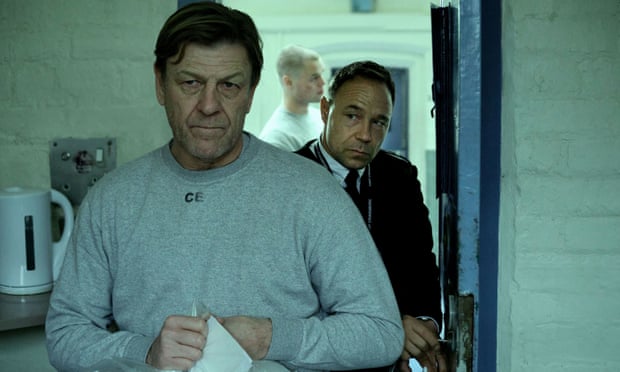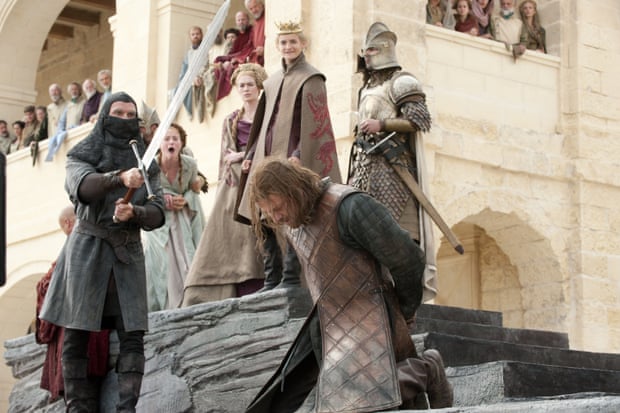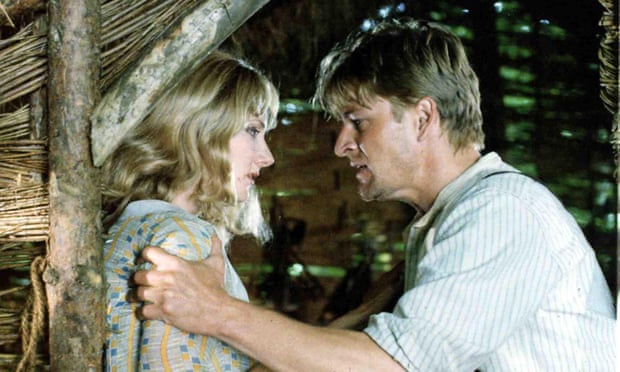Sean Bean used to be known as an action hero – a gritty Hollywood hard man who usually died before the credits rolled. Yet the past decade has seen him become one of our most reliably excellent dramatic actors: a tender, terrific performer with multiple awards to show for it.
Now 63, he trained as a welder in his home city of Sheffield before discovering acting, winning a scholarship to Rada in London and becoming a member of the RSC in 1986. He found mainstream fame in the 90s as the swashbuckling hero of ITV’s period action romp Sharpe. His film roles have included a terrorist in Patriot Games, a James Bond villain in GoldenEye and Boromir in the Lord of the Rings trilogy. On TV he has starred as Mellors in the BBC’s 1993 adaptation of Lady Chatterley’s Lover, Mr Wilford in current dystopian drama Snowpiercer and Ned Stark in Game of Thrones.
Bean won an International Emmy in 2013 for his performance as a cross-dressing teacher in Jimmy McGovern’s Accused, followed by a Bafta in 2018 for his role as a troubled Catholic priest in McGovern’s Broken. His next collaboration with the writer was in the 2021 prison drama Time, which won Bean his second Bafta for best leading actor.
He now stars alongside Nicola Walker in writer-director Stefan Golaszewski’s new BBC drama Marriage, about a middle-aged couple who have been together for 27 years. It’s all a long way from Napoleonic derring-do and Bond villainy, and also somewhat ironic given that Bean has been wed five times. He moved to Somerset with his fifth wife, Ashley Moore, in 2017, and recently said: “I’m a romantic, otherwise I wouldn’t have kept getting married. I don’t regret anything. I’d live it all again.”
Were you a fan of Stefan Golaszewski’s previous series, Mum?
I watched all of Mum and it was extraordinary. Bold, uncompromising, provocative in its own way. I just thought: “Here’s a man who writes exactly how he feels and translates that on to the screen.” There’s no dilution of his original idea. Stefan’s work has pathos. He picks up on all people’s little foibles. Those vulnerabilities and insecurities that we all feel but rarely express. I was listening to the Velvet Underground yesterday and the lyrics somehow reminded me of his scripts. It’s this dark reality, which sometimes seems quite cruel and sad, but with sly humour. Stefan should call himself “the Lou Reed of screenwriting”(laughs).
Was the chance to act opposite Nicola Walker a factor?
I was bowled over by her performance in [ITV crime drama] Unforgotten. She has a very natural approach to performance and we complemented each other. Sometimes you just have chemistry with someone. That’s what I had with Nicola.
You play suburban married couple Ian and Emma. Tell us about their relationship?
On the surface, often not a great deal seems to be happening, but underneath there’s a lot going on. Through Stefan’s economy with words, you realise they’re often saying the opposite of what they truly feel. There’s a wealth of emotion to be mined from everyday interactions.
It feels like theatre, or a Mike Leigh film…
It’s very much in that vein. Stefan said the other day how it’s hard to be a human being. To come downstairs every morning and have to speak to people. Cats and dogs don’t need to do that. They just sit there (laughs).
The opening scene is set on a plane, which seems cruel. Don’t you have a fear of flying?
It was OK because I knew it wasn’t a real plane. I did fear flying for a long time. I’d grip the armrest, almost in tears. I used to have to have a lot to drink before I even got on the plane, then a lot to drink on it. By the time I got off, it was shocking. But suddenly, around 9/11, there was all this talk of possible attacks on planes and long-range missiles from terrorists. I thought: “Why am I worrying about engine failure if there’s all this going off?” And somehow I got over it. I still can’t stand turbulence but I’m much better now, thank God.
There’s a devastating crying scene in episode one of Marriage. How did you channel that emotion?
To express it truthfully you can’t wing it. You’ve got to think about something upsetting in your life that fixes the feeling in your head. That means going back to unpleasant memories but there’s no other way. You often don’t need to do sob or wail, because when people cry, they usually try and hide it. Facial expressions are incredibly articulate when you’re trying to hide powerful emotions. We’ve all seen that on the news or documentaries, when people are reliving tragedy. The only way to replicate that is to think it and live it.
Were you delighted by the reaction to Time last year?
Very happy. It was four years in the making from Jimmy McGovern’s initial idea, so a lot of work went into it. The subject matter interested me. A lot of us, especially men, think about being sent to prison and wonder how we’d cope.

Do you think it was an accurate depiction of prison life?
Prisoners and prison officers have said how realistic it is. It even started conversations about the prison system – the shortage of staff, how people are left to stagnate, how we should make more effort to rehabilitate them. Certain people are dismissive of prisoners but they need our support, both while they’re inside and after they come out. It was good to stir up controversy and raise those points.
You first worked with Stephen Graham a decade ago on Tracie’s Story, an award-winning episode of Jimmy McGovern’s series Accused. How was being reunited with him on Time?
We’ve formed a great working relationship, us two and Jimmy. I’d always admired Stephen. He’s bang on in every role, especially This Is England: chameleon-like. So I jumped at the chance to work with him but never imagined it would be as lovers (laughs). But we got stuck in and had a brilliant time. The final scene was me watching him get taken off to prison, while I went free. And then at the end of Time, Stephen’s character got sent down, while I was getting out. I said to him: “Fucking hell, Stevie, this feels familiar, doesn’t it?”
Which role do you get recognised most for nowadays?
It used to be Sharpe, then it was Game of Thrones and The Lord of the Rings. But now I get Time too. It was so widely seen and people tend to remember it.
Is it true that you don’t like being killed off? There’s a compilation of your death scenes on YouTube…
I’ve seen that. Is it called a Death Reel? I’m not too bothered. If it’s a good part, it’s worth dying for. With scripts, I used to read from the end to see if I was still in them. I’d go: “Oh no, I only last until page 34.” When you’re starting out, you’re much more dispensable. Now they might keep me alive and get their money’s worth (laughs).
Game of Thrones was a shocker, wasn’t it?
When I first met the Game of Thrones writers, they told me: “You die but you’re in it for nearly the full season.” But he was a great character and it was a good death, so I didn’t mind. Boromir’s [in The Lord of the Rings] was probably the best death I’ve ever done. It was just so heroic and tragic. I did get a reputation for dying on screen but I’d prefer to stay alive now, if you don’t mind.

There’s also a YouTube compilation of you saying “bastard” in Sharpe…
That’s quite funny, I didn’t realise how many times I said that. Maybe it would be a good thing to show drama students: here’s how to say the word “bastard”, as demonstrated by a specialist.
You started out in theatre, but it’s been a while. Would you like to do more stage work?
Possibly, if it’s a project I felt passionately about – and if it’s not for too long. You get these six-month runs sometimes and it’s a wonderful experience, but it does become repetitive. I don’t like being formulaic. I enjoy changing it up with different media, different genres, unique avant garde directors. I’d certainly describe Stefan as such, and Marriage as an unusual piece.
Is it strange to be 63 and still a sex symbol?
Am I? That’s news to me but I’ll take it as a compliment and say it feels great (laughs).
You live in Somerset now. What took you there?
It was just by chance. I moved down to London for drama school and ended up staying for 35 years. But my friends were slowly drifting away and I began to realise London wasn’t the nucleus of everything. And then my wife and I just saw this wonderful, curious house, which made our minds up. It’s set in two acres of lovely land with wild gardens. It’s not a big house but it’s quirky and interesting.

And you’ve become a keen gardener?
I was out this morning, actually. I find it very relaxing and comforting. There’s a lot to look after. I’ve made it wildlife-friendly because I love to attract birds and butterflies, insects and animals. We’ve got a pond with swallows flying over it. There are stoats, weasels and bats. We’ve planted trees, shrubs and meadows. It keeps me busy, although I do get a bit of help. Jeremy, my gardener, does all the spadework. I just put things in position. He digs the holes.
You’re a big music fan. What have you been listening to recently?
Mainly old stuff. I love the Velvet Underground, as you’ve probably guessed. The Beatles, Stones, Bowie, Iggy. I put on Brian Eno’s [1978 ambient album] Music for Airports in the background quite a lot.
If you had your time again, would you still be an actor?
I would. But it’s not ended yet (laughs). I’ve had wonderful experiences and travelled the world. It never really crosses my mind to do anything else, but I’d have loved to be an artist. I try and draw or paint. I get all the pens and pastels together, then just end up doodling on a bit of scrap. I love using my hands and my imagination, being productive and making things. I suppose acting combines all those elements. That’s what makes it so rewarding.
What’s next?
An opera of a religious nature called The Witches Seed. My friend Jonathan Moore has written the libretto and I’m voicing a character. Gabriel Byrne, Chrissie Hynde and Stewart Copeland are involved, so it should be interesting. Otherwise, I’m enjoying some time at home. Taking a breather, recharging my batteries and pursuing my other interests. There’s more to life than acting, isn’t there?




















![[Book Review] The Blade Itself (The First Law Trilogy) by Joe Abercrombie](https://bendthekneegot.com/wp-content/uploads/2018/01/1516047103_maxresdefault-218x150.jpg)
















